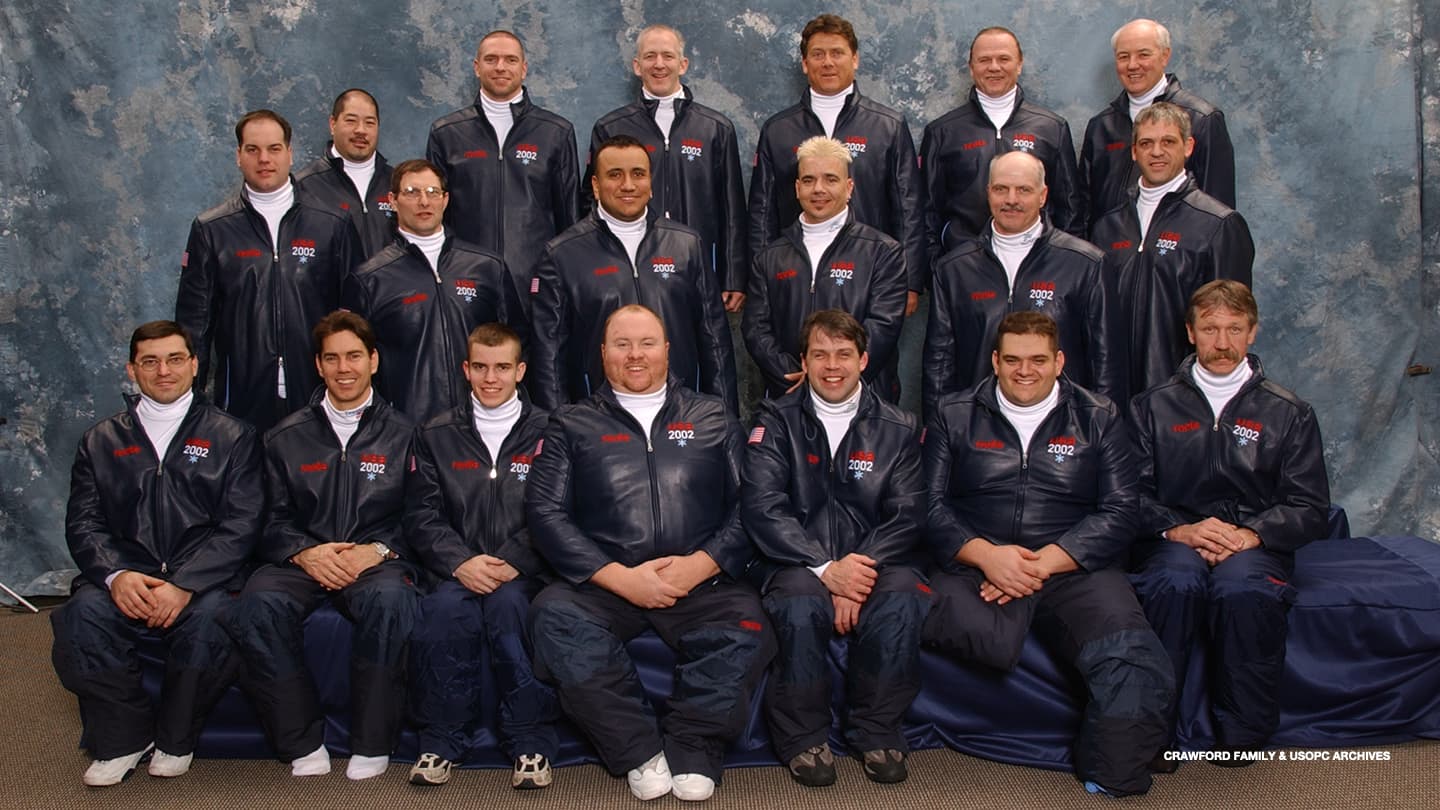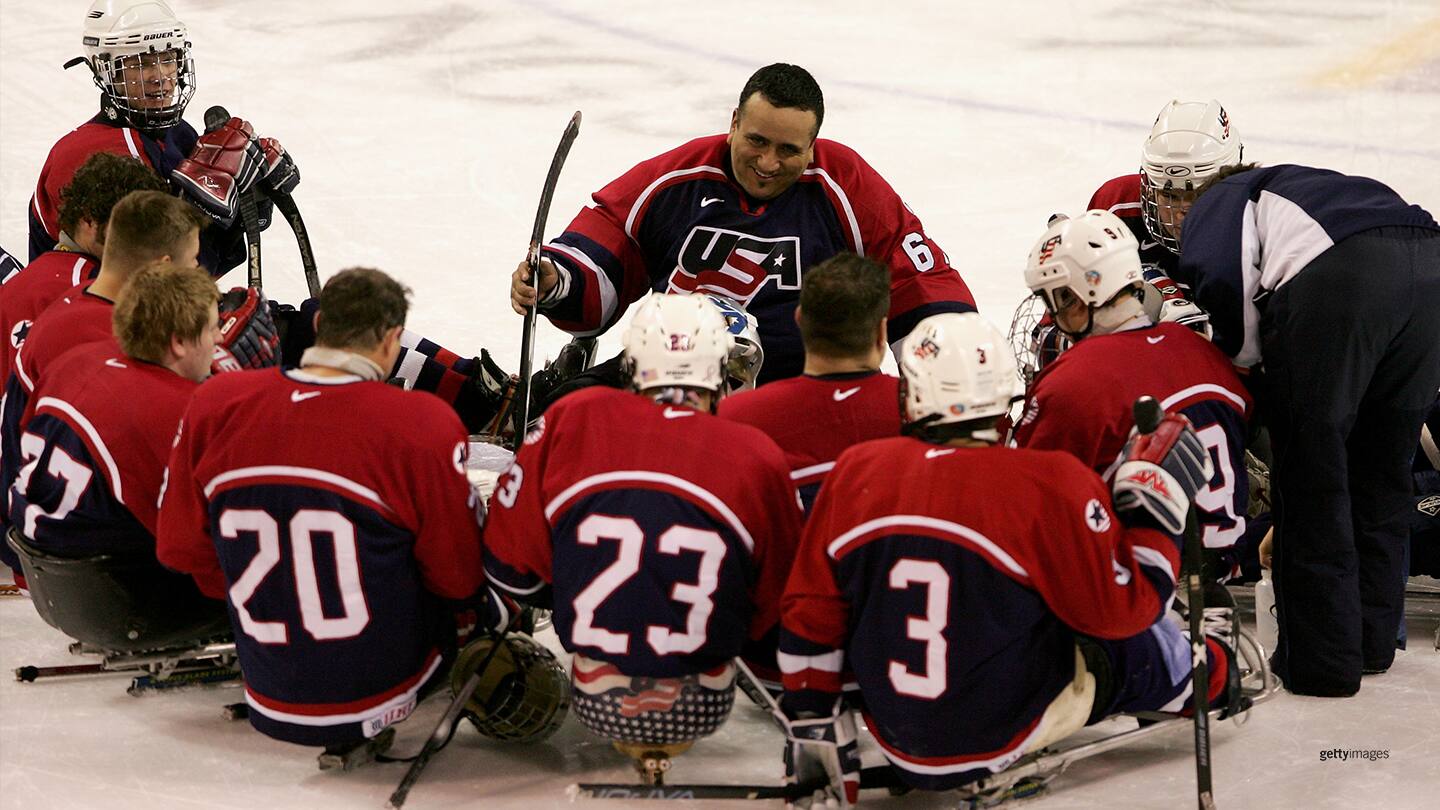
An Incredible Turnaround Led The U.S. Sled Hockey Team To 2002 Gold, And Now The Hall Of Fame
by Bob Reinert

The 2002 U.S. sled hockey team poses for a team photo.
The former Boston Bruins great walked down an alleyway from his hotel in Tampa, Florida, at 5 a.m., looked ahead, and couldn’t quite believe his eyes.
“I turned the corner, and I remember seeing down the street the silhouettes under the streetlamps, a couple of wheelchairs rolling down the middle of the street,” recalled Rick Middleton. “My first thought was, ‘Boy, these guys are dedicated.’ I had no clue how long it takes these guys to get ready and in their sleds.”
Middleton was on his way to his first training camp with members of the U.S. sled hockey team as their new head coach. They had a 6 a.m. training session at the local arena. Already having made his name in hockey as a player over 14 seasons in the NHL, 12 as a Bruin, Middleton had taken over the U.S. team when the previous coach quit after the world championships.
“I didn’t know that brand of hockey,” Middleton recalled. “I didn’t even know what sled hockey was.”
Middleton was taking control of a team that had finished sixth of seven teams in the previous Paralympic Games, and dead last at the previous world championships in 2000. The U.S. only qualified for the Paralympic Winter Games Salt Lake 2002 because it was the host team.
“I thought it was going to be a challenge,” said Middleton, who had never played in the Olympics. “I wanted to experience it.”
Because of what Middleton and his players accomplished in 2002, on June 24 — two decades later — they will become the first Paralympic team inducted into the U.S. Olympic & Paralympic Hall of Fame.
“It’s awesome,” Middleton said. “We’re hoping that every guy can make it.”
That 2002 group earned that recognition after going undefeated in Salt Lake City to win the gold medal, the first for the U.S. in the sport. Since then, the Americans have become the bona fide power in sled hockey, having now won four straight Paralympic gold medals. The foundation for all that success was laid by Middleton’s team.
As Middleton recalled assistant coach Tommy Moulton saying: “We were the spark that lit the fire.”
Those early days weren’t easy, however. It was a learning experience for Middleton, who recalled warming up his players in that first practice.
“I yelled, ‘backwards,’ and they all stopped and looked at me. They don’t go backwards,” Middleton said, laughing. “It was pretty funny.”
Only a handful of players had returned from the previous Games, so Middleton had to build the 2002 team from the ground up.
“They didn’t have a system,” Middleton said. “We decided we had to teach them some sort of a system in a very short time that wouldn’t be so complicated that they could get it because we had different levels … of players on the team.
“I just put in an old Don Cherry system. If you don’t get the puck down low, you’re not going to score. It’s an old system that worked pretty well. It obviously worked. The system works.”
Once he got acclimated, Middleton treated the guys no differently than other hockey players.
“I didn’t think it would be much different than able-bodied hockey, and it wasn’t,” he said. “These guys are as passionate about the game of hockey as any professional NHL player today.”

Manny Guerra (C) and the U.S. sled hockey team in between periods against Canada at the USA Cup championships game on Feb. 12, 2006 in Colorado Springs, Colo.
Middleton and Moulton had watched film of the team’s previous games and identified some issues.
“What we noticed was defensively they were staying in the zone too long, and offensively they were just chasing the puck,” Middleton said. “The other team had it most of the time.”
As Middleton pointed out, this was a mature team.
“Our average age was something like 36,” said Middleton, mentioning the likes of goaltender Manny Guerra, defenseman Dan Henderson and forward David Conklin. “We had the grandfathers of sled hockey. These guys were the first sled hockey players in the U.S.”
They played younger than that in Salt Lake City, going undefeated, including a 4-3 shootout victory over defending champion Norway in the gold-medal game.
“I had no (idea) we would ever be in that position,” Middleton said. “I never even thought about gold or silver. I thought if we’re going to win a medal, it may be bronze.”
Guerra remembered how tense it was in the locker room before the final game. Middleton and Moulton arranged to have 1980 Olympic hockey gold medalist Mike Eruzione speak with the team by phone. Eruzione gave them a motivational talk before hanging up.
The room went quiet before Josh Wirt, at age 17 the youngest American player, spoke up.
“Who was that?” Guerra remembered Wirt saying. “We just started laughing.”
A record-setting crowd of 8,315 was on hand for that gold-medal game. Guerra will never forget them or the other people he met at the Games.
“The fans of Salt Lake City were incredible,” said Guerra, of Plymouth, Minnesota. “I got to meet a lot of cool people. Everybody was just superb. Salt Lake just rocked. I love the fans of Salt Lake. They were so supportive.”
Guerra pointed to the Americans’ third game — a 2-1 round-robin win over Norway — as the key to the 2002 Paralympic tournament.
“That was the game that we needed to get over the hump,” Guerra said. “The puck looked as big as a watermelon that game. To me, everything was in slow-motion. I was really in the zone in that game.”
At that point, Guerra thought that something special was happening for the U.S. team.
“Obviously, there’s a changing of the guard right there,” Guerra said.
When Guerra got the news that he and the rest of the 2002 U.S. team were headed to the U.S. Olympic & Paralympic Hall of Fame, he was hit with “a lot of emotion. You think about all people that elevated your game, elevated the sport itself, the natural evolution of the sport. They all contributed a piece of that to make the game better.
“It’s still a little surreal. I don’t think it’s really sunk in yet for me personally. You’re humbled by it. You know what it takes to get there. You know the sacrifices that you experienced. There’s a lot of things you give up.”
Bob Reinert spent 17 years writing sports for The Boston Globe. He also served as a sports information director at Saint Anselm College and Phillips Exeter Academy. He is a contributor to TeamUSA.org on behalf of Red Line Editorial, Inc.